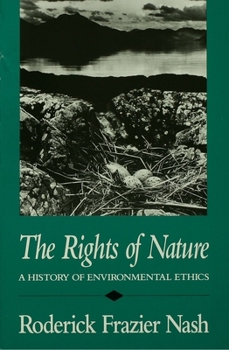Rights of Nature Rights of Nature Rights of Nature: A History of Environmental Ethics a History of Environmental Ethics a History of Environmental Eth
Select Format
Select Condition 
Book Overview
Charting the history of contemporary philosophical and religious beliefs regarding nature, Roderick Nash focuses primarily on changing attitudes toward nature in the United States. His work is the first comprehensive history of the concept that nature has rights and that American liberalism has, in effect, been extended to the nonhuman world.
Format:Paperback
Language:English
ISBN:0299118444
ISBN13:9780299118440
Release Date:November 1989
Publisher:University of Wisconsin Press
Length:304 Pages
Weight:0.96 lbs.
Dimensions:0.7" x 6.0" x 9.0"
Customer Reviews
3 ratings
A great intellectual history of the environmental movement
Published by Thriftbooks.com User , 18 years ago
The Rights of Nature is primarily written as an intellectual history of the progression of environmentalist thought in western civilization. In the book, Nash seeks to frame environmentalism and the concept of the rights of nature as being intrinsic to the progression of the liberal democratic tradition. The narrative of his study traces the development of expanding notions of rights in the context of western thought as they apply to non-human life forms and the environment itself. In order to build a foundation for his study, Nash traces ethical thought concerning nature all the way back to the origins of Judeo-Christian theology and later to the development of the scientific method. Nash traces the origins of the disconnection between humans and nature in western culture to the biblical teachings and especially the book of Genesis, which theologians have used for centuries as an ethical justification for mankind's dominion over nature, citing verses in which God gives mankind dominion over all earthly lifeforms. This disconnection was further exacerbated by the scientific revolution. Nash cites the ethical thought of early scientists such as Rene Descartes as being responsible for this further disconnection. The scientific method was based on the deconstruction of notions of interconnections in nature and built around the ability of humans to isolate the component parts of life in order to serve the needs of humanity. Nash states that Descartes was responsible for "providing a general philosophy of the irrelevance of ethics to the human-nature relationship" (p.17). After a brief establishment of origins, Nash moves on to the effect that the 17th and 18th century "democratic" revolutions in countries such as France, England and the United States had on the expansion of ethics to a wider area. Nash cites extremely influential philosophers of democratic liberalism such as John Locke and John Stuart Mill as providing one of the early expansions of ethical thought to include selected members of the animal kingdom. Locke advocated an ethical position toward domestic animals and wild animals whereby their abuse would constitute a breech of ethics. His position, as Nash states, still was predicated on an anthropocentric and utilitarian notion of the importance of refraining from the abuse of animals. Locke believed that people "who delight in the suffering and destruction of Inferior creatures, will not...be very compassionate, or benign to those of their own kind" (p.19). Although Locke's argument assigned to animals the right to freedom from abuse, it was based upon how this freedom would benefit humanity and was not based on any type of belief in animals inherent right to exist free from abuse. The difference between anthropocentric and biocentric thinking in regards to the expansion of ethics to concern plants and animals is a central focus of Nash's book. Although Locke and others of his time period were enmeshed in anthropocen
'right'-ly needed natural history
Published by Thriftbooks.com User , 20 years ago
This book, as all of Prof. Nash's writings, serves as the standard to compare against all others in the growing field of environmental theory and related scholarship. Nash expands upon his codex of natural "rights" in relation to America's foremost natural thinker - Thoreau - in his Afterword to my recently published book "Deep Immersion: Thoreau's Engagement with Water."
thoughtful, intensive, well-written
Published by Thriftbooks.com User , 26 years ago
This is a very informative and crisply written history of environmental thought and politics in the U.S., from John Muir to Peter Singer. It offers a great deal of thoughtful commentary, for example on the gradual shift in focus from tangible benefits for humans (underlying the conservation and national parks movement circa 1900) to inherent rights of nature itself (signalled e.g. by the Endangered Species Act). It's not hard to see that Nash is sympathetic to many of these causes, and clearly this book isn't for folks who prefer to view things in strictly economic terms, but still it is quite well-balanced in tone, and the scholarship is really impressive. I highly recommend it to anyone interested at all in the environmental movement, or American intellectual history generally, or simply looking for some thought-provoking reading. 220 pp., plus 50 pp. of notes.






